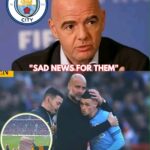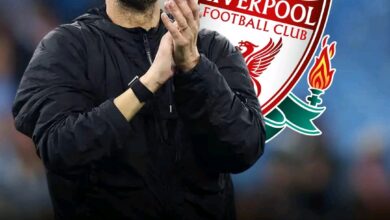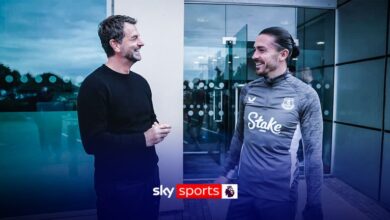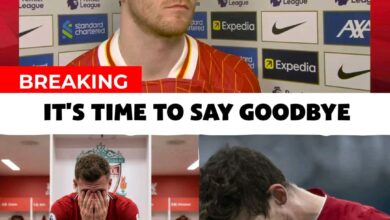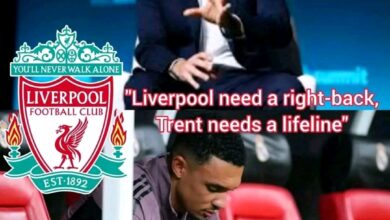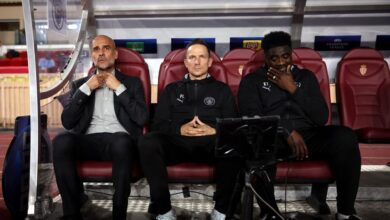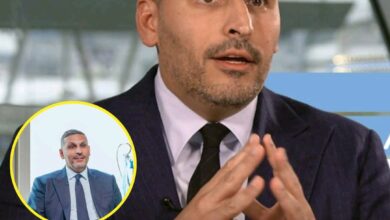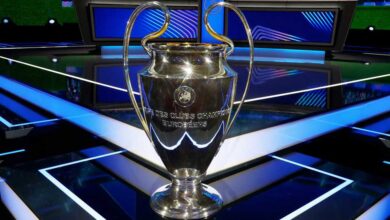Manchester City Take Swift Action Following Derby Day Bar Incident: A Comprehensive Analysis
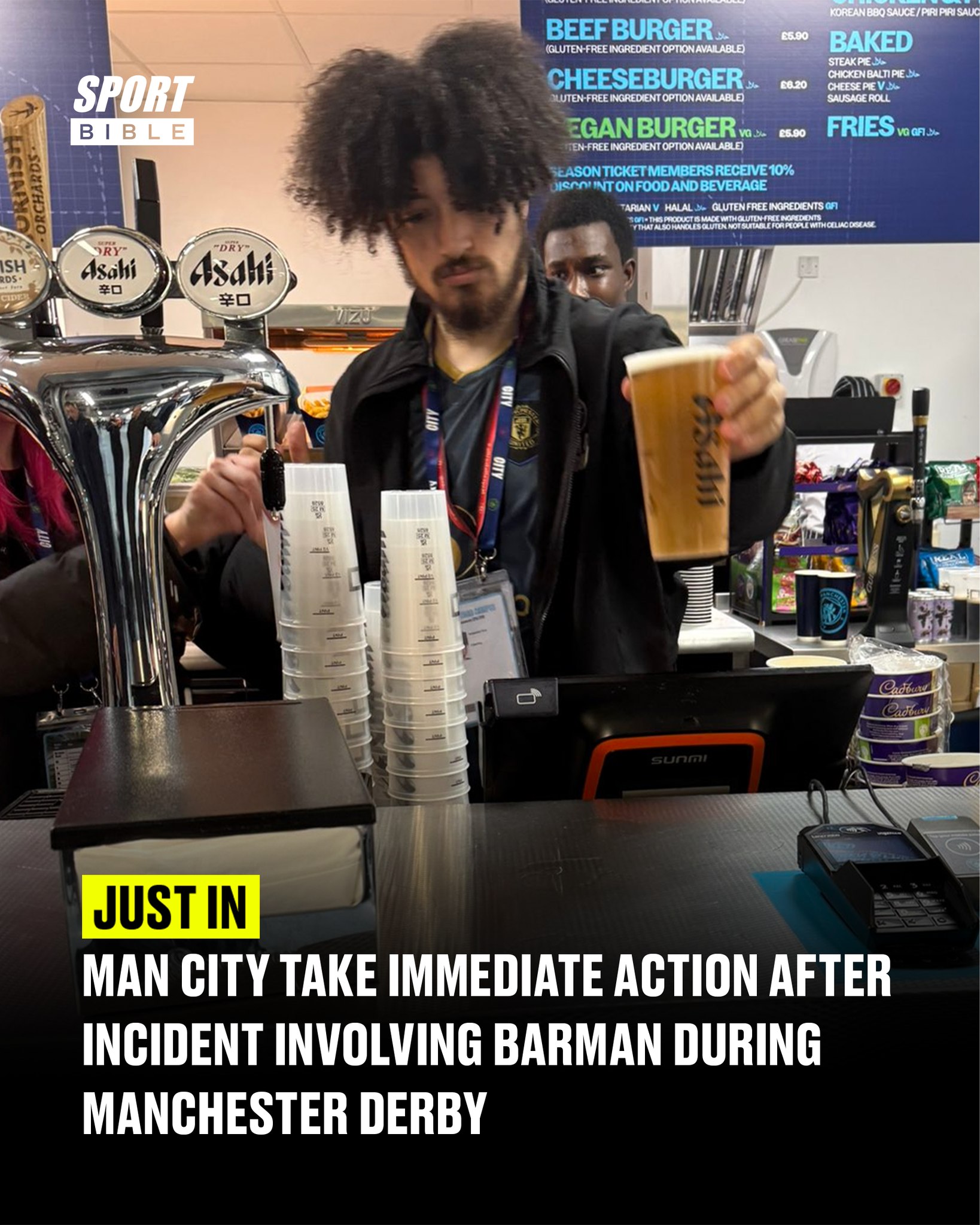
The Manchester Derby has always been one of football’s most passionate and heated encounters, where loyalties run deep and emotions soar to unprecedented heights. The rivalry between Manchester City and Manchester United transcends mere sporting competition, representing decades of cultural, geographical, and social identity that defines the very essence of Manchester’s football landscape. However, the September 14, 2025 encounter at the Etihad Stadium became memorable not just for the action on the pitch, but for an unprecedented incident that unfolded in the stadium’s hospitality areas, highlighting the intense passion that permeates every aspect of derby day.
What began as a routine pre-match service at one of the Etihad’s numerous bars quickly escalated into a viral social media controversy that captured the attention of football fans worldwide. The incident, involving a barman who brazenly displayed Manchester United colors while serving drinks to Manchester City supporters, exemplified the raw emotions and unwavering loyalty that characterize one of English football’s most storied rivalries.
The Incident Unfolds
As thousands of Manchester City supporters made their way through the Etihad Stadium’s concourses in anticipation of kick-off, excitement and nervous energy filled the air. The atmosphere was electric, with fans donning their sky blue colors and singing traditional songs that have echoed through Manchester’s streets for generations. However, in Block 315’s bar area, an extraordinary scene was about to unfold that would overshadow the pre-match festivities.
A Manchester City supporter, later identified on social media as Stuart (@Mataniels), was among those seeking refreshment before settling into his seat for the crucial derby encounter. As he approached the bar, he witnessed something that left him incredulous and immediately compelled him to document the moment. A member of the bar staff, presumably fulfilling his duties in what should have been a professional and neutral capacity, made a provocative gesture that would soon reverberate across social media platforms.
The barman in question, while appearing to conduct his duties normally, suddenly unzipped his outer jacket to reveal a Manchester United shirt underneath. This deliberate act of defiance occurred in full view of Manchester City supporters who were purchasing drinks and snacks, creating an immediate atmosphere of tension and disbelief. The timing of this revelation, coming just hours before one of the season’s most anticipated fixtures, added an extra layer of audacity to the gesture.
Stuart, recognizing the inflammatory nature of what he had witnessed, immediately reached for his phone to capture photographic evidence. The resulting image showed the barman, clearly identifiable in his Manchester United colors, serving an Asahi beer to a customer while maintaining what appeared to be a mischievous expression. This photograph would soon become the catalyst for a social media storm that would reach far beyond the confines of the Etihad Stadium.
Social Media Eruption
At 2:47 PM on September 14, 2025, Stuart shared his experience on social media platform X (formerly Twitter), posting the now-infamous photograph alongside a message that perfectly captured his frustration and disbelief. His post read: “Absolute joke @ManCity – letting one of the bar staff in block 315 wear a United shirt on Derby Day #mcfc.” The post was accompanied by the hashtag #mcfc, ensuring it would reach the attention of the wider Manchester City fanbase.
Stuart’s follow-up comment, “He shouldn’t be wearing it – it’s only going to cause trouble!” proved prophetic, as the post quickly gained traction across social media platforms. The image struck a nerve with football supporters, not just those affiliated with Manchester City or Manchester United, but fans of clubs across England who understood the sacred nature of derby day traditions and the expectation of neutrality from stadium staff.
The post’s viral nature was immediate and overwhelming. Within hours, it had accumulated thousands of interactions, with fans sharing, commenting, and expressing their own opinions about the unprecedented situation. The rapid spread of the content demonstrated the power of social media in modern football culture, where incidents that might once have remained localized can now reach global audiences within minutes.
Fan Reactions and Community Response
The response from the football community was swift and varied, reflecting the complex emotions that derby day incidents can evoke. Many Manchester City supporters expressed outrage at what they perceived as a betrayal of professional standards and basic respect for the home supporters who were, ultimately, the customers funding the barman’s wages.
However, the reaction was not uniformly negative. Some fans, including supporters of other clubs, found humor in the situation, appreciating the audacity and timing of the barman’s gesture. One particularly memorable comment read: “The only man in a United shirt that’s put in a decent performance at the Etihad today,” a reference that would prove ironically prescient given Manchester United’s subsequent poor performance on the pitch.
Another supporter commented: “This lad should never have to buy a beer in town again,” suggesting that some viewed the barman’s actions as a bold statement of loyalty rather than a professional transgression. This divided reaction highlighted the complex nature of football fandom, where actions can be simultaneously condemned and celebrated depending on one’s perspective and allegiances.
The incident also sparked broader discussions about professionalism in football hospitality, the role of stadium staff in maintaining neutral environments, and the extent to which personal loyalties should be suppressed in professional settings. Many argued that while fans are expected to display unwavering loyalty to their teams, those employed by clubs should maintain professional neutrality, particularly in customer-facing roles.
Manchester City’s Response
Manchester City’s response to the incident demonstrated the club’s commitment to maintaining professional standards and respecting their supporters’ experience at the Etihad Stadium. The club’s social media monitoring systems, which constantly scan for mentions and potential issues, quickly identified the viral post and recognized the need for immediate action.
At 4:20 PM on September 14, 2025, less than two hours after Stuart’s initial post, Manchester City published an official statement on their Fan Support page. The response was direct and unambiguous, reading: “Thank you for making us aware of this. We can confirm that this individual has now been removed from their position.”
The swiftness of the club’s response reflected several key considerations. Firstly, Manchester City recognized the potential for the incident to escalate if left unaddressed, particularly given the volatile nature of derby day emotions. The club understood that allowing such behavior to go unpunished could set a dangerous precedent and potentially encourage similar acts of provocation in the future.
Secondly, the response demonstrated Manchester City’s commitment to their supporters’ match day experience. The club recognized that fans invest significant time, money, and emotional energy in supporting their team, and that they deserve to feel comfortable and respected within their home stadium. Allowing staff to openly display opposition colors would undermine this basic expectation.
The club’s decision to terminate the barman’s employment, while perhaps seeming severe to some observers, reflected the seriousness with which Manchester City viewed the incident. Professional sports organizations operate in highly charged emotional environments, and staff are expected to understand and respect the sensitivities involved.
The Match Context
The timing of this incident was particularly significant given the context of the match itself and the current state of both clubs. Manchester City entered the derby as the dominant force in recent Manchester football history, having won multiple Premier League titles and established themselves as one of Europe’s elite clubs under the guidance of Pep Guardiola.
Manchester United, meanwhile, were in a period of transition under new manager Ruben Amorim, who had taken over with the mandate of returning the club to its former glories. The Portuguese manager faced the enormous challenge of revitalizing a squad that had underperformed for several seasons and rebuilding the confidence and identity that had once made Manchester United the dominant force in English football.
The pre-match atmosphere was therefore charged with additional significance. For Manchester City, the derby represented an opportunity to further cement their superiority over their cross-town rivals. For Manchester United, it was a chance to demonstrate that Amorim’s appointment marked the beginning of a new era and a return to competitive football at the highest level.
Against this backdrop, the barman’s gesture took on additional meaning. His willingness to display Manchester United colors in the heart of the Etihad Stadium could be interpreted as a statement of defiant optimism about his team’s prospects, or alternatively, as an act of provocation designed to unsettle the home supporters.
The Match Itself
Unfortunately for Manchester United supporters, including presumably the dismissed barman, the on-field action provided little reason for optimism or celebration. Manchester City delivered a dominant performance that underlined the gulf in quality and confidence between the two sides, securing a comprehensive 3-0 victory that never appeared in serious doubt.
Phil Foden opened the scoring with a goal that showcased the technical excellence and tactical sophistication that has become synonymous with Pep Guardiola’s Manchester City. The young English midfielder’s ability to find space and execute precise finishing demonstrated why he has emerged as one of the Premier League’s most exciting talents.
Erling Haaland, Manchester City’s Norwegian goal machine, then added two goals that further emphasized United’s defensive frailties and City’s attacking prowess. Haaland’s clinical finishing and physical presence caused constant problems for the United defense, highlighting the significant investment City had made in securing one of world football’s most prolific strikers.
The comprehensive nature of the victory served to highlight the irony of the pre-match incident. While the barman’s gesture had suggested confidence in Manchester United’s prospects, the reality of the 90 minutes that followed provided a stark reminder of the current disparity between the two clubs.
Post-Match Analysis and Reactions
Following the final whistle, Ruben Amorim faced the difficult task of explaining his team’s disappointing performance to the media and supporters. The Portuguese manager’s honest assessment of the game revealed both his understanding of the challenges facing Manchester United and his determination to address the fundamental issues that had contributed to such a comprehensive defeat.
“In these kind of games we need to be perfect, and we weren’t perfect,” Amorim acknowledged in his post-match interview. This frank admission demonstrated the manager’s realistic appraisal of his team’s current capabilities and the standards required to compete at the highest level of English football.
Amorim’s analysis of the goals his team conceded revealed tactical awareness and attention to detail that suggested hope for future improvement. “If you look at the goals, we can avoid them. We suffer goals that we can avoid. We can do better, that is clear – like the first goal, we can be more aggressive. The frustration is there.”
The manager’s comments about needing to take chances and work on transitions highlighted the comprehensive nature of United’s problems. The team was not only defensively vulnerable but also lacking the clinical edge in attack that separates successful teams from those that struggle to compete at the highest level.
Broader Implications
The incident involving the Etihad barman, while seemingly minor in the context of football’s broader landscape, actually highlighted several important themes that resonate throughout modern professional sports. The episode demonstrated the intense scrutiny under which every aspect of major football clubs now operates, where individual actions can quickly become global news stories.
The incident also illustrated the power of social media to amplify and accelerate controversies in ways that were impossible in previous eras. What might once have remained a localized talking point among a small number of supporters was transformed into a viral sensation that reached audiences around the world within hours.
From a business perspective, the incident highlighted the importance of comprehensive staff training and clear guidelines regarding appropriate behavior in professional settings. Football clubs like Manchester City operate as major entertainment and hospitality businesses, where customer experience is paramount and staff actions can significantly impact brand reputation.
The swift resolution of the situation demonstrated Manchester City’s understanding of these dynamics and their commitment to maintaining professional standards throughout their organization. The club’s willingness to take decisive action, even in response to what some might consider a relatively minor incident, reflected their recognition of the importance of supporter confidence and satisfaction.
Professional Standards in Modern Football
The incident raised important questions about the expectations placed on staff working within professional football environments. While fans are encouraged and expected to display passionate loyalty to their teams, employees of football clubs occupy a different position, where professional neutrality becomes a key requirement.
This expectation extends beyond match days to encompass all aspects of club operations. Staff members, regardless of their personal allegiances, are expected to represent their employers in a professional manner that respects the sensitivities of supporters and maintains the integrity of the match day experience.
The barman’s actions could be viewed as a breach of this fundamental understanding. By choosing to display opposition colors while serving home supporters, he created an uncomfortable and potentially confrontational situation that detracted from the positive atmosphere the club works to maintain.
However, the incident also highlighted the complex human dynamics at play within football clubs, where staff members often have deep personal connections to the teams and communities they serve professionally. The challenge for clubs lies in respecting these personal connections while maintaining professional standards that serve the broader interests of supporters and stakeholders.
Conclusion
The Manchester Derby of September 14, 2025, will be remembered for Manchester City’s dominant 3-0 victory and Ruben Amorim’s sobering introduction to the realities of the Manchester United rebuild. However, the incident involving the dismissed barman added an unexpected dimension to the narrative, highlighting themes that extend far beyond the immediate context of the match.
The episode demonstrated the passionate intensity that surrounds one of football’s greatest rivalries, where even seemingly minor gestures can provoke strong reactions and become focal points for broader discussions about loyalty, professionalism, and respect. It also illustrated the speed with which modern social media can transform localized incidents into global talking points, creating new challenges and opportunities for football clubs in managing their reputations and relationships with supporters.
Manchester City’s swift and decisive response to the incident reflected the professionalism and attention to detail that has characterized the club’s operations throughout their recent period of success. By taking immediate action, they demonstrated their commitment to maintaining high standards throughout their organization and respecting the match day experience of their supporters.
For Manchester United, the comprehensive defeat served as a sobering reminder of the work required to close the gap with their city rivals. Ruben Amorim’s honest assessment of his team’s performance suggested both realistic understanding of current limitations and determination to drive the improvements necessary for future success.
The incident, while ultimately a footnote to the main narrative of the match, provided a fascinating glimpse into the complex emotions, loyalties, and expectations that define modern football culture. It reminded us that in th



